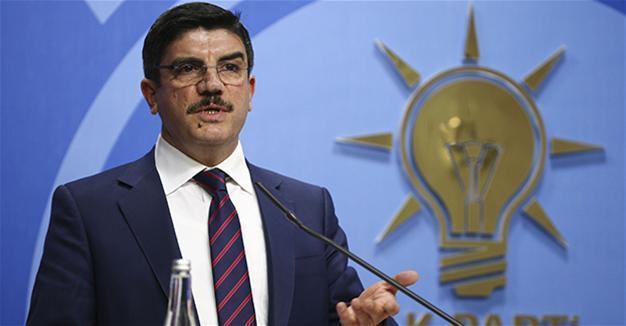Turkish ruling party deputy head calls Trump’s travel ban ‘racist’
ANKARA

AA photo
Ruling Justice and Development Party (AKP) Deputy Chair Yasin Aktay has described U.S. President Donald Trump’s travel ban on seven Muslim-majority countries as “racist.”
“All of the countries mentioned and added to the list are crisis spots in their region and face systematic slaughter, massacres and violence, as well as human rights violations. There is only one word for [countries] that shut their doors to people- even Green Card holders - fleeing such places and seeking shelter. That word is racist,” said Aktay at a press conference after an AKP central executive board meeting on Feb. 1 in Ankara.
“This is totally against human rights, a big violation of human rights,” he said, adding that he had started to “worry about the future of the U.S.”
The executive order Trump signed on Jan. 27 suspends the arrival of all refugees for a minimum of 120 days, suspends the arrival of Syrian refugees indefinitely, and bars all citizens from Iran, Iraq, Libya, Somalia, Sudan, Syria and Yemen for 90 days.
“We are experiencing an era when human rights have hit rock bottom in the U.S. But of course we also follow with interest and joy the voices rising inside American society against these implementations,” Aktay said.
Protests were held across the U.S. and in airports after travelers and migrants with valid visas from the seven identified countries were held at border gates following Trump’s signing of the executive order.
Iraqi President Fuad Masum said on Feb. 1 that the decision to ban Iraqi citizens from entering the United States was “a shock” and called for it to be reviewed.
Masum was the latest in a string of Iraqi officials to condemn Trump’s executive order, a move billed as an effort to make America safe from “radical Islamic terrorists.”
Iraq’s inclusion among “the countries whose citizens are prohibited from travelling to the United States is a shock to us,” Masum said in a statement.
Former CIA Director David Petraeus said the executive order was blocking a senior Iraqi military official from traveling to the U.S. to meet with his American counterparts.
Petraeus said during his testimony on Feb. 1 before the House Armed Services Committee that Gen. Talib al-Kenani, commander of Iraq’s counterterrorism forces, could not meet in person with officers from U.S. Central Command. The command in Tampa, Florida, oversees U.S. military operations against the Islamic State extremist group in Iraq and Syria.
‘Dumb deal’ drags Australia-US ties to new low after tense Trump call
Meanwhile, Trump labeled the U.S.’s refugee swap deal with Australia “dumb” on Feb. 2 after the Washington Post reported on an acrimonious telephone call with Australian Prime Minister Malcom Turnbull, which threatened a rare rift in ties between the two staunch allies.
The Post reported that Trump described the resettlement plan as “the worst deal ever” and accused Australia of trying to export the “next Boston bombers,” according to Reuters. It said the call had been scheduled to last an hour but Trump cut it short after 25 minutes when Turnbull tried to turn to subjects such as Syria.
Turnbull told reporters the call with Trump at the weekend had been frank and candid but refused to give further details.
“I do stand up for Australia. My job is to defend Australian interests,” Turnbull said in Melbourne.
As reports of the conversation hit headlines on both sides of the world, Trump tweeted shortly before midnight in Washington: “Do you believe it? The Obama Administration agreed to take thousands of illegal immigrants from Australia. Why? I will study this dumb deal.”
That threw more confusion over the status of the controversial deal Australia agreed with former President Barack Obama late last year for the United States to resettle up to 1,250 asylum seekers held in offshore processing camps on Pacific islands in Papua New Guinea and Nauru.
In return, Australia would resettle refugees from El Salvador, Guatemala and Honduras.
Many of those being held in the Australian detention centres, which have drawn harsh criticism from the United Nations and rights groups, have fled violence in countries such as Afghanistan, Iraq and Iran.
White House spokesman Sean Spicer and the U.S. Embassy in Australia have both said Trump would honor the deal. In several media appearances after Trump’s tweet, Turnbull reiterated that he believed the deal stood.
“He is saying that this is not a deal he would have made, but the question is will he honour that commitment? He has already given it,” Turnbull said. “I make Australia’s case frankly, powerfully, forthrightly and hopefully persuasively when I deal with other leaders.
